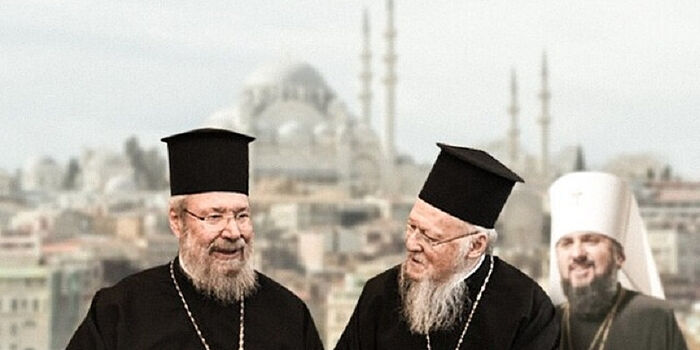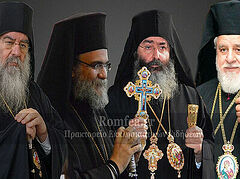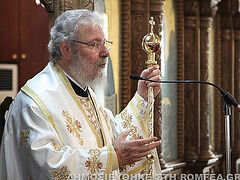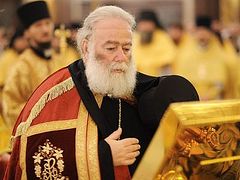Limassol, Cyprus, October 27, 2020
Archbishop Chrysostomos of Cyprus broke his promise to the Holy Synod of the Church of Cyprus when he commemorated the schismatic Epiphany Dumenko on Saturday, and his unilateral decision effectively “abolishes the Synod of the Church,” His Eminence Metropolitan Athanasios of Limassol revealed yesterday.
Met. Athanasios was present at the Liturgy in which the primate of the schismatic “Orthodox Church of Ukraine” was commemorated but left upon hearing his name. He explained that he left without speaking to the Archbishop, so as to avoid saying something he might regret.
That same evening, together with three other hierarchs of the Cypriot Church—Metropolitans Nikiforos of Kykkos and Isaiah of Tamassos and Bishop Nicholas of Amathountos—he published an appeal to Abp. Chrysostomos to renounce his unilateral decision.
In his comments yesterday, Met. Athanasios emphasized that the bishops’ disagreements with Abp. Chyrsostomos concern more than just the question of whether Patriarch Bartholomew acted rightly in creating the OCU and granting it autocephaly, reports Romfea.
“At the moment, our problem is that the Archbishop raised this question at the session of the Holy Synod on September 9, and at that time, all the members of the Holy Synod, almost without exception, told the Archbishop that he should not do this, and he himself said that he wouldn’t, because the members of the Synod expressed a different view, and he will respect the view of the Synod,” the Metropolitan of Limassol recounted.
All of the Synod members were satisfied with this assurance, and thus the commemoration of Epiphany Dumenko on Saturday came as a great shock and cause for grief, he said, “because the Holy Synod of the Church of Cyprus is thereby abolished, and we do not agree with this act.”
Abp. Chrysostomos’ behavior in the matter of commemorating Epiphany Dumenko mirrors that of Patriarch Theodoros of Alexandria, who also broke his promise to the Cypriot hierarchs, and Met. Athanasios in particular, that he would not commemorate the schismatic while serving on their canonical territory. Pat. Theodoros commemorated Dumenko in a church in Limassol on Nov. 9 last year, having first commemorated him in Cairo just the day before, also without a Synodal decision.
While the Archbishop is the primate, he cannot make decisions that effect the entire Church without his Holy Synod, Met. Athanasios said—“neither the Archbishop without the Synod, nor the Synod without the Archbishop.”
A decision concerning the OCU should be made by a majority vote of the Holy Synod, Met. Athanasios said, adding that he would submit to this majority decision even if he personally disagrees. However, he is not sure if the Archbishop will call a Synod or not, although the Archbishop has commented that he will convene a Synod if called upon to do so.
Met. Athanasios also noted that apart from the hierarchs that he drafted the appeal with, he has not spoken to the other Cypriot hierarchs about the matter. Thus, it remains to be seen how others will respond, though informed sources suggest that the hierarchs are fairly evenly split, and that Pat. Theodoros recently visited Cyprus precisely to attempt to persuade bishops to acknowledge the schismatics.
Asked to respond to the reaction of the Russian Church, Met. Athanasios said: “The Russian Church has already excluded the Archbishop of Cyprus from its diptychs, and this is very important and very painful, and I do not know what consequences this will have in other spheres.”1
Cyprus is home to many Russians, and many others vacation there every year. In certain areas, restaurants offer menus in Russian and businesses include Russian on their signs, and many see Russia as a necessary ally politically, especially in the context of the aggravating situation with Turkey, while Ukrainian President Vladimir Zelensky signed a military agreement with Turkey during his recent visit to Istanbul.
There are also strong spiritual ties between the two Churches. Last year, a joint Cypriot-Russian Church monastic conference was held, and there are several churches in Cyprus specifically built in a Russian style for the Russian faithful, such as the Church of St. Andrew and All Russian Saints in the Tamassos Diocese, whose Metropolitan was among the authors of Saturday’s appeal to Abp. Chrysostomos.
Interestingly, Met. Nikiforos of Kykkos has revealed that the Archbishop initially decided not to send his letter of recognition of the OCU to Pat. Bartholomew after discussing it with Cypriot President Nicos Anastasiades.
Met. Nikiforos also emphasized that the “there is a risk of schism within the Church in Cyprus, while the functioning of the Orthodox Church has also been hindered.”
While Metropolitans Athanasios and Nikiforos came together to formulate an appeal to the Archbishop, it seems they have different emphases on how to proceed. Whereas Met. Athanasios confirmed that he would accept the decision of the Synod, even if he personally disagrees, Met. Nikiforos stated: “We will not convene a Synod to ratify an illegitimate act of the primate of our Church.”
Synods do not exist to rubber stamp the arbitrary decisions of their primates, but to make decisions in advance, he explained.
Met. Nikiforos also reiterated that Epiphany Dumenko is a schismatic who is unrecognized by other Churches, except for the Constantinople and the primates of Alexandria and Greece. Regarding those hierarchs who have not taken a stance on the issue, the Metropolitan of Kykkos believes they must not sit back and tacitly accept the violation of the good order of the Church.
The sacred canons are clear, he said: Entering into communion with schismatics makes one a schismatic. After last February’s Synod session, Met. Nikiforos published his own state, emphasizing that it is unacceptable to have Eucharistic Communion with unordained schismatics.
Met. Nikiforos also reiterated that Pat. Bartholomew should convene a pan-Orthodox council of a Synaxis of the primates to deal with the Ukrainian issue. Even if unity could be achieved in Ukraine, the problem of the invalid ordinations of the clergy of the OCU and the Sacraments celebrated by them would still need to be resolved, he said.
However, it is unlikely that Pat. Bartholomew will convene such a council, as he has thus far repeatedly ignored the calls of his brother bishops.





